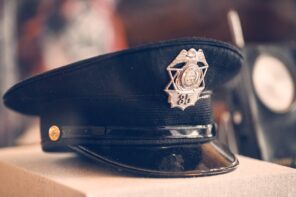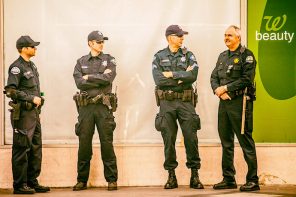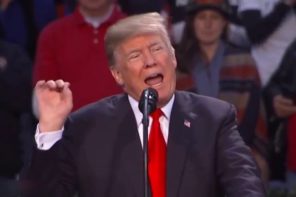On September 20th, mere hours after the police shooting death of Keith Lamont Scott in Charlotte, North Carolina, pastor and professor Andre E. Johnson took to Twitter and started the hashtag #WhiteChurchQuiet to address the inadequacy of the white church in responding to police brutality and the harm that silence does to Black communities. The hashtag soon went viral, generating hundreds of tweets and retweets and quickly becoming a Twitter trending topic. Johnson will be hosting a #WhiteChurchQuiet live tweet session tomorrow, September 28th at 10pm EST.
After hearing the news that law enforcement officials had shot and killed two more black men, I braced myself. Invariably from some of the protesters and others within the black community, there is the refrain, “Where is the Church?”
What they mean to ask is: “Where is the Black Church?”
I know this refrain because even though I serve as a pastor in a Black church and celebrate its traditions, I too have asked this question.
Some rightfully claim that since Black Lives Matter did not start as a Black church movement, the church should not take part in this movement. But I and many others have consistently asked: why not? Why should the church sit on the sidelines when there is a movement of liberation happening right outside our doors?
So I do get it—the Black church has been missing in action on a host of issues and concerns germane to the African American Community.
However, if there is any response from Christians concerning American injustice, it will typically come from the Black Church.
At its best, the Black Church has been the home of the African American Prophetic tradition, birthed from slavery and shaped in Jim and Jane Crow America.
Through struggle and sacrifice, this tradition has expressed black people’s call for unity and cooperation, as well as the community’s anger and frustrations. It has been both hopeful and pessimistic. It has celebrated the beauty and myth of American exceptionalism and its special place in the world, while at the same time damning it to Hell for not living up to the promises and ideals America espouses.
So, when I saw African American pastors and ministers marching with protesters and speaking out, yet again, on abusive police tactics, I found myself asking a different question: “Where was the white church in all of this?
I began to wonder: do they have anything to say about these killings? I wondered what they are preaching and teaching in their churches. I mean, what would it look like for a group of white clergy to come to a bank of microphones and declare that black lives matter—or for those same clergy to request a meeting with the police director and the DA?
My thinking about this is influenced by a book I’ve recently read: Joseph Reiff’s, Born of Conviction: White Methodists and Mississippi’s Closed Society. It is the story of 28 United Methodist pastors who stood against the segregation in the state of Mississippi by writing and then signing the “Born of Conviction” statement.
By today’s standards the document is mild but in 1963 when the Mississippi Methodist Advocate published it, it shook white Christian churches across the state.
While some Mississippians offered public and vocal support to the statement, the overwhelming response was negative. By the middle of 1964, 18 of the 28 signatories left the state of Mississippi to pursue their pastoral vocations. Even a mild, theologically-rooted statement, deeply rooted in its church’s tradition was not enough to overcome the hatred and racism that filled the hearts of many in their pews during this time.
Along with this historical reflection, I’ve also been disturbed, dismayed and disheartened by the recent research on white churches and race. According to a recent Public Religion Research Institute survey, white Christians simply are far less likely to believe the experiences of Black Americans.
On the subject of police killings, for example, while over 80 percent of Black Christians believe that police killings are part of a much larger problem of how African Americans are policed, 70 percent of white Christian believe the opposite.
It is hard to solve a problem when people don’t believe that one exists.
To find some answers, I took to Twitter and started the #WhiteChurchQuiet hashtag.
I did this because I wanted to hear from members of predominantly white churches and get their reasoning behind the silence. I wanted to know what pastors and preachers were saying when yet another black person is shot and killed; I wanted to know how many—who already celebrate law enforcement on a regular basis—would also stand with the victims of police brutality; and I wanted to know if Black Lives Matter is mentioned in white churches, and if so how it is talked about.
#WhiteChurchQuiet why do we expect black churches to carry the banner of justice and let white churches off the hook?
— Andre E. Johnson (@aejohnsonphd) September 21, 2016
How can you serve God in a black city and remain ignorant and silent about race for decades on end? #WhiteChurchQuiet
— Charles W. McKinney (@kmt188) September 21, 2016
Re-educate. And my list is much longer. Literally, the only thing white people know about MLKjr is "I Have a Dream" #WhiteChurchQuiet pic.twitter.com/ZkRag8kcA1
— Nate ¯_(ツ)_/¯ (@natebyr0n) September 22, 2016
"I have been gravely disappointed with the white moderate." –MLK https://t.co/80pEEND9ho #WhiteChurchQuiet
— Nyasha Junior (@NyashaJunior) September 22, 2016
#WhiteChurchQuiet I guess, like everywhere, we are only invited to entertain
— Frank Johnson (@frankwilliam77) September 21, 2016
Many who participated in the Twitter chat shared their frustration about their church’s silence on race in general, while others joined in to “listen and learn.” But the overwhelming response from people who attend white churches was that many white churches leaders are simply afraid to speak out. They fear isolation and many are concerned about their positions and future positions in the church.
This implies that they do know what they do, but they simply decide to remain quiet because it’s the easier route.
If this is true, it also says something else: why is it always hard, no matter who you are, to stand up for Black lives?
Why is it always “courageous” to stand with Black people?
Why is there risk involved in speaking out against injustice toward Black people?
Why is it that even if you offer a mild response—just asking people to listen to what Black people are saying, you run the risk of offending others?
The questions that birthed #WhiteChurchQuiet are still with me.





